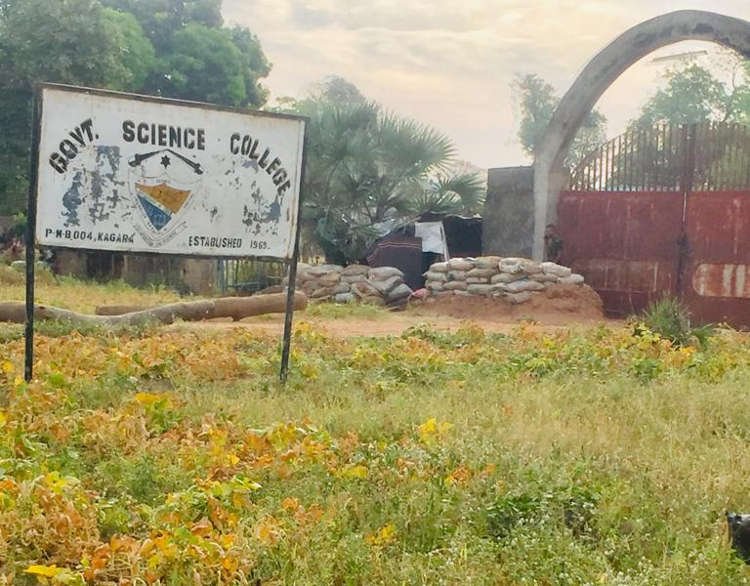It is now two years since the attack on Government Science College in Kagara, Niger State, but many residents and indigenes of the town still live in fear.
Travelling to Kagara, which is the headquarters of Rafi local government area (LGA), is risky. That’s according to a group of four residents who stood in front of a motor park under a dazzling noontime sun.
‘Bandits have taken over our land’, one of them, Usman Abubakar, told Development Diaries as he lamented the poor state of security in the area.
Africa’s most populous nation still accounts for the highest number of out-of-school children in the world, with the United Nations International Children’s Emergency Fund (UNICEF) reporting in 2022 that about 18.5 million children, the majority of whom are girls, do not have access to education in Nigeria.
Figures from the UN agency also show that over 60 percent of these children are in the country’s northern region, and there are over 700,000 out-of-school children in Niger State, north-central Nigeria, according to the Niger State Universal Basic Education Board (SUBEB).
The number is increasing in the state due to the atrocious activities of bandits, including kidnapping, arson, rape, cattle rustling, and killing in Shiroro, Rafi, Munya, and Mariga LGAs. And despite the presence of soldiers and police operatives in Kagara, the sense of fear among residents is palpable.
A check by Development Diaries revealed that only schools located along roadsides are open as many public schools have since been shut down due to persistent attacks by bandits.
In fact, less than ten secondary schools in the LGA are operational, severely impacting the quality of teaching and, sadly, contributing to the number of out-of-school children in the state.
Musa Nasir, a resident and teacher at Women Day College, which is along the Kaduna-Birnin Gwari-Kagara Road, told Development Diaries that many parents withdraw their children from school as a result of banditry.

‘Some parents withdraw their children, particularly the girls, but it is a lack of confidence in the government and the system’, he said.
‘Some of them [girls] got married because of insecurity. Before the attack [the raid on Government Science College in February 2021] this school [Women Day College] had more than 1,000 students. Now, SS3 has only 13 students’, he said.
‘You know it is only when people are secure that they think about education or providing quality education to the people.
‘We understand these bandits work with informants in Kagara and Minna, and they easily notice strange faces around. That is what is happening’.
One of the affected students is Sefiya Hassan, who dropped out of the Ahmadu Attahiru Secondary School in the Sabongari area of Kagara.
The 16-year-old, who stopped going to school after her junior secondary education, has little hope of returning to school.
‘My parents cannot afford my school fees and they say school is not safe’, Sefiya, whose parents are farmers, told Development Diaries.
Impact on quality education
Reacting to the security concerns, the Chairman of the Niger SUBEB, Isah Adamu, said banditry and other forms of insecurity have made it more difficult for the board to recruit instructors in the impacted areas.
According to him, quality and standard education will be impossible to achieve as insurgency has a bigger detrimental impact on out-of-school children in any country.
This has a significant negative impact on schoolchildren, particularly girls, because some parents already have pre-existing ideas about not sending their female children to school.
NUT reacts
The Nigerian Union of Teachers (NUT) in Niger State has decried the level of damage the activities of kidnappers, insurgents and bandits have inflicted on the educational system.
The state NUT Chairman, Akayago Mohammed, explained that the awful development has adversely affected the desired delivery of quality education in the school system, calling on the government to urgently provide viable and safe alternative means towards ensuring the resumption of normal academic activities in the affected schools.
Declaration without action
Nigeria endorsed the international Safe Schools Declaration in March 2015 and ratified it in 2019. Based on this declaration, the country is obliged to ensure programmes and policies to prevent and respond to attacks against schools and to fight impunity for such attacks.
However, four years after its ratification, the federal government failed to implement the emergency programme meant to increase access and quality of education for over 40 million schoolchildren.
Civil society sets basic education agenda
Responding to this challenge, a coalition of international and local organisations in Nigeria developed a manifesto on basic education with three key advocacy ‘asks’ – make senior secondary education free; fund more, fund better; and make schools safe.
The coalition includes the Education Champions Network (ECN) in Nigeria, which includes YouthHubAfrica; Save the Children; Plan International; Civil Society Action Coalition on Education For All (CSACEFA); and Malala Fund.
They are demanding that students deprived of educational facilities as a result of conflict, violence or crisis are promptly given access to accessible alternative temporary schools, in line with the National Guidelines for Accelerated Basic Education.
‘What we want to do with this manifesto is engage with the candidates, interact with them and get their commitment on what they would want to do with education, either through their signatures, endorsing it and adopting it’, Malala Fund Programme Director for Nigeria, Fatima Askira, said.
‘This way, we get a valid reason to ensure that when they are in office, we can come back and say this is what you promised us; so we can have them sign and agree to what is in the manifesto and have them commit to it’.
Accelerated education approach
Speaking to Development Diaries, the Head of Social Development Programme at Plan International Nigeria, Laban Onisimus, called on state governments in Nigeria to adopt the accelerated education approach to reduce the number of out-of-school children.
The federal government, in June 2022, launched the Accelerated Basic Education Programme (ABEP) to ensure that out-of-school children return to school. The launch was under the auspices of the Nigerian Educational Research and Development Council (NERDC).
‘Education cannot wait for crises. So we have engaged with the government to develop a curriculum that has been approved by the National Council of Education’, Onisimus said.
The objective of ABEP is to provide an alternative educational programme suitable for the needs of overage out-of-school children and youths, and in the process mainstream them to regular school programme or provide them with alternative career paths through enrolment into vocational training centres.
‘Yes, a child is ten years old, he has dropped out of school, or he has never been to school; for you to ask that child to go to a conventional school, he won’t fit in there because the learners are either older than him or younger than him’, Onisimus explained.
‘So there is a part way to it: establish community learning centres where that child will pass through nine months. By the time he is done with the nine months, based on a particular level, is the equivalent of either primary three or primary six of formal school’.
Other ways Nigeria can address this challenge, according to the 12-page civil society manifesto, is to effectively and immediately roll out the implementation of the Safe Schools Plan of Action and the National Policy on Safety, Security and Violence Free Schools.
This report is produced with support from YouthHubAfrica under its Basic Education Media Fellowship funded by Malala Fund and Rise Up.

